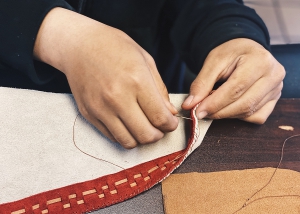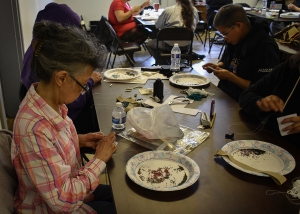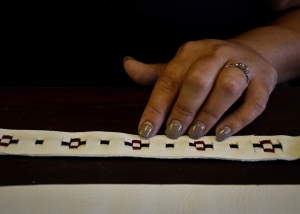Unangax̂ Regalia Making Workshop in Akutan
Grantee: Native Village of Akutan
Story from Haliehana Stepetin, Workshop Leader
The Regalia Making Workshop held in Akutan on August 3rd through 13th, 2021 was a wonderful community event that brought together an intergenerational group of participants around a shared desire to learn and revitalize Unangax̂ Ancestral clothing and regalia. In previous years, regalia making had not been open to the entire community but was prioritized for members of the village dance group, the Akutanam Ax̂asniikangin. This workshop was the first of its kind considering it was led from within the community and was available to all community members, not only dancers. As the lead artist and project director, it was important to me to offer a class that anyone in the community could attend. The older generation of Akutan did not have many opportunities to participate in cultural projects such as making their own regalia. This was largely due to colonial interruptions in the transmissions of Unangax̂ culture and knowledge, and particularly, the legacy of U.S. assimilationist boarding school policies that pervaded the school system until recently. Several participants that attended the Regalia Making Workshop represent this generation.
The workshop, held over the course of ten days, had ten to fifteen participants each day. Several participants joined to learn how to sew their own Unangax̂-style women’s headdresses. For the eight to twelve participants creating their own sax̂, the full-length regalia in Unangam Tunuu, it was critical to teach them how to cut furs and the associated technique of skin sewing. Part of teaching participants to make their own regalia includes revitalizing family designs that stopped being transmitted during Russian and early American colonial periods. This revitalization includes participants designing their own individualized regalia. In the past, basic regalia construction and short time periods left little room to create personalized regalia with associated family designs. However, I thought it was important to reflect personal individuality and kinship relations in the design of regalia, even if that lengthened the time it would take to complete regalia. Considering that a lot of our family designs have no longer been transmitted for several generations, this workshop was an opportunity to revitalize those and create shared designs for many participants who share kinship lineages. These designs are often reflected in the weavers, or the small pieces of leather with intricate designs connecting panels of regalia, on cuffs, and the bottom of regalia.
As a Qigiiĝun Unangax̂ living away from my homelands/waters, it is extremely important for me to pass on the knowledges of skin sewing and regalia making to my own community in hopes that they continue sharing these skills in Akutan. All participants of the workshop reminded me of the strength of our community, the significance of gathering to create and share, and how working together fosters cohesiveness and cultures of respect –the very values I was raised with in Akutan.
It was important for me to teach the skill of regalia making to my community in hopes that all Unangax̂ Peoples can have their own regalia. In my experience attending university outside the state of Alaska, I noticed that many Indigenous Peoples elsewhere have their own personalized regalia, whether they are dancers or not. It’s important to me to revitalize this part of our culture as a way to facilitate belonging for all community members, especially those who were denied opportunities to truly bear our culture in their upbringing. This way, we can bring our whole selves to spaces and not simply “walk in two worlds.” Learning the skill to make our own regalia and wearing it at special events, for dance, and other significant occasions is an act of cultural reclamation. I taught this workshop with reclamation and revitalization in mind, with a desire to instill agency in Qigiiĝun Unangax̂ of Akutan, and to be able to foster belonging and empowerment for all community members.



